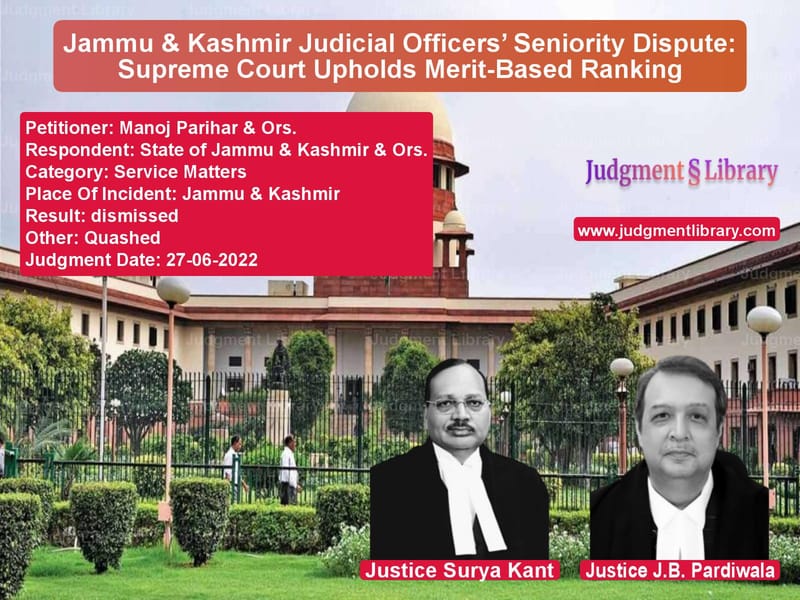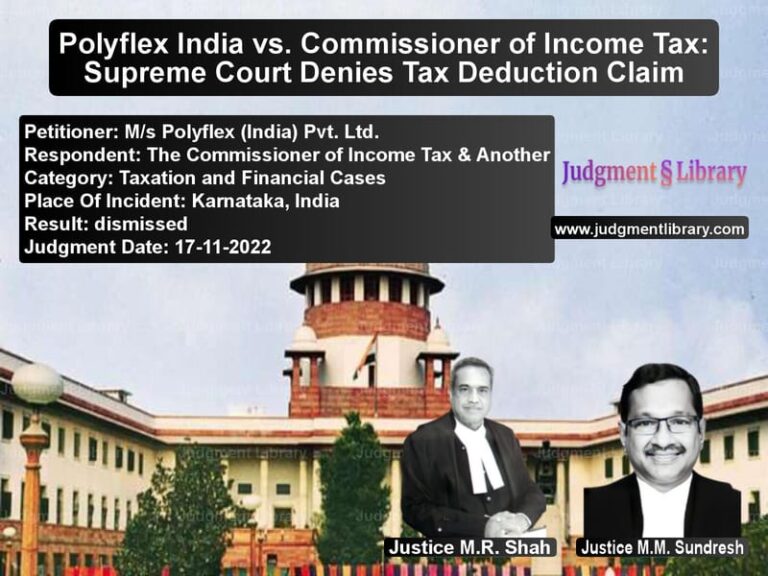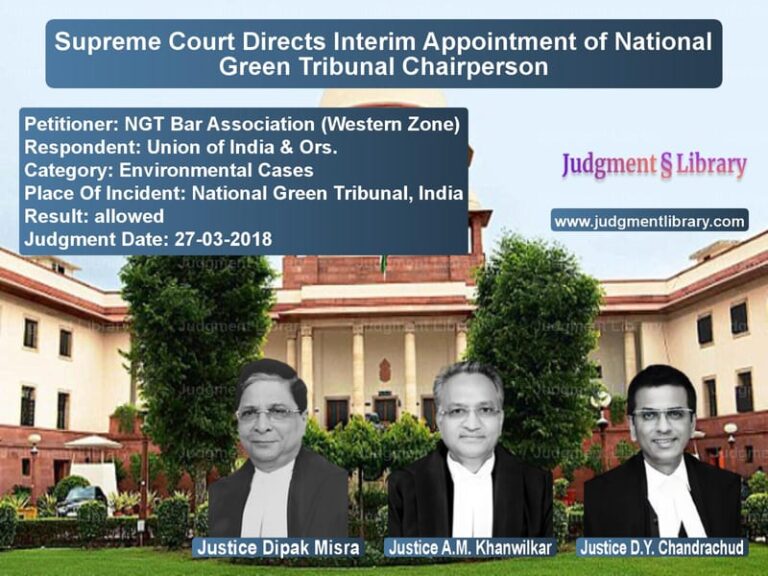Jammu & Kashmir Judicial Officers’ Seniority Dispute: Supreme Court Upholds Merit-Based Ranking
The Supreme Court recently ruled on a significant judicial service seniority dispute in the case of Manoj Parihar & Ors. v. State of Jammu & Kashmir & Ors.. The case revolved around the fixation of seniority for Munsiffs (Judicial Magistrates) in Jammu & Kashmir and their eligibility for promotion to Sub-Judge positions. The Supreme Court upheld the principle that seniority should be determined based on merit rather than the roster points used for direct recruitment.
The ruling put an end to a long-standing conflict regarding how reserved category officers should be ranked in seniority lists when promoted. The Court quashed the methodology that had allowed reserved category officers to gain seniority over general category officers despite lower scores in the recruitment examination.
Background of the Case
The dispute concerned the 2003 batch of Munsiffs who were appointed through the Jammu & Kashmir Civil Services (Judicial) Examinations, 2002. Their seniority was initially determined using the roster system, as per the Jammu & Kashmir Reservation Rules, 2005.
The petitioners, including Manoj Parihar, challenged the seniority list prepared by the High Court, arguing that it unfairly allowed reserved category candidates to rank above general category candidates with higher merit scores. They sought a revised seniority list based purely on exam merit.
The legal proceedings unfolded as follows:
- 2010: A gradation list was prepared applying the roster system, displacing higher-scoring general candidates.
- 2015: The Jammu & Kashmir High Court struck down the gradation list and ruled that seniority should be based on merit.
- 2016: The ruling was challenged in the Supreme Court, leading to an order for reconsideration.
- 2022: The High Court reaffirmed its ruling that merit, not roster points, should determine seniority.
- June 27, 2022: The Supreme Court upheld the High Court’s ruling.
Petitioner’s Arguments
The petitioners contended that:
- The seniority list should be based on exam merit, not reservation roster points.
- The Jammu & Kashmir Reservation Rules, 2005, which introduced roster-based seniority, should not apply retrospectively to appointments made in 2003.
- They had already been promoted as Civil Judges (Senior Division) but needed correct placement in the seniority list.
- High-scoring candidates were being unfairly denied promotions due to a flawed seniority list.
Respondent’s Arguments
The respondents, including the Jammu & Kashmir High Court and reserved category officers, argued that:
- The gradation list was prepared in accordance with existing rules, and reserved category officers were entitled to the benefits of reservation.
- The High Court had been following the roster system since 1995, and changing it now would disrupt settled positions.
- The 2005 Reservation Rules were in effect when the gradation list was prepared, making them applicable.
- The petitioners had already been promoted, and revising seniority would create administrative difficulties.
Key Observations of the Supreme Court
The Supreme Court ruled in favor of merit-based seniority and made the following key observations:
“In the case of direct recruitment, the preparation of an inter-se merit list of selected candidates is inevitable. The recruitment authority cannot place candidates arbitrarily under the rule of thumb or by adopting methodologies inconsistent with Articles 14 and 16 of the Constitution.”
The Court emphasized:
- The reservation roster is meant for ensuring adequate representation, not for determining seniority.
- Promotions and seniority should be based on merit, not reservation points.
- The 2005 Reservation Rules could not be applied retrospectively to 2003 recruits.
- The Full Court Resolution of 1994, which had been used to justify roster-based seniority, was not legally sustainable.
Final Judgment and Directions
The Supreme Court issued the following directives:
- The gradation list dated 01.06.2010 was quashed.
- The Jammu & Kashmir High Court was directed to reframe the seniority list strictly in accordance with exam merit.
- Any candidates who were denied eligibility for higher judicial service examinations due to the incorrect seniority list would be given an opportunity to appear in future limited competitive exams.
- The High Court was instructed to ensure that the new seniority list did not disrupt existing promotions unless necessary.
Conclusion
The Supreme Court’s ruling reinforces the principle that merit should be the sole criterion for seniority in direct recruitment cases. The decision ensures that reserved category candidates get representation but do not displace higher-scoring candidates in seniority rankings.
By striking down the 2010 gradation list, the ruling also protects the rights of general category candidates who were unfairly pushed down in the seniority hierarchy. This judgment sets a precedent for future disputes involving reservation policies and judicial promotions.
Petitioner Name: Manoj Parihar & Ors..Respondent Name: State of Jammu & Kashmir & Ors..Judgment By: Justice Surya Kant, Justice J.B. Pardiwala.Place Of Incident: Jammu & Kashmir.Judgment Date: 27-06-2022.
Don’t miss out on the full details! Download the complete judgment in PDF format below and gain valuable insights instantly!
Download Judgment: manoj-parihar-&-ors.-vs-state-of-jammu-&-kas-supreme-court-of-india-judgment-dated-27-06-2022.pdf
Directly Download Judgment: Directly download this Judgment
See all petitions in Promotion Cases
See all petitions in Recruitment Policies
See all petitions in Judgment by Surya Kant
See all petitions in Judgment by J.B. Pardiwala
See all petitions in dismissed
See all petitions in Quashed
See all petitions in supreme court of India judgments June 2022
See all petitions in 2022 judgments
See all posts in Service Matters Category
See all allowed petitions in Service Matters Category
See all Dismissed petitions in Service Matters Category
See all partially allowed petitions in Service Matters Category







